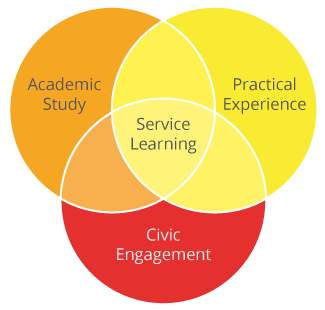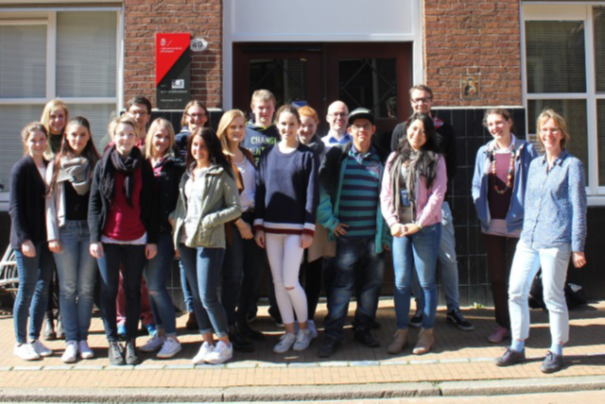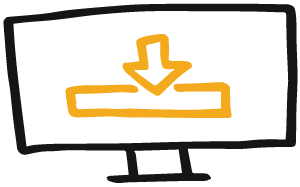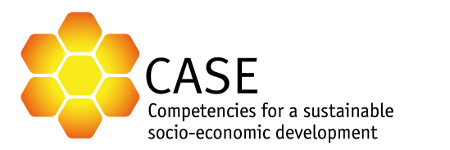 What is it about?
What is it about?

Service Learning or learning by engagement represents one of the most promising methods promoting Education for Sustainable Development. It is an alternative teaching approach where students are confronted with real-world problems and try to find solutions cooperating with partners such as communities, NGOs and companies.
Students learn and develop through engaging in concrete projects by meeting the needs of communities and making personal experiences, embedded in an academic learning environment where they can reflect upon their actions.
Involvement of communities, NGOs or companies demands a well-organized preparation process. Individual consultations to introduce the purpose and design of service learning to project partners are vital. Getting to know concrete project examples, tasks and possible impact of service learning projects helps to better understand, plan and implement projects in practice.
Most important is the creation of an inclusive space, based on trust and continuous feedback processes between all involved stakeholders: Be open about different organizational infrastructures, resources and time frames between practice partners and lecturers. Try to communicate transparently and link different involvement of capacities into the learning process.
Invite students, practitioners and university partners for a kick-off event encouraging an inclusive, open atmosphere in the beginning of the course. Student groups (4-5 persons) and partners get to know each other personally and discuss their backgrounds as well as the partners’ challenges. Plan such spaces for deliberation processes during all project phases and offer coaching sessions to foster critical dialogue between students and partners. In-class sessions should integrate scientific and non-scientific perspectives and foster co-creation processes of new knowledge.
The service learning approach often challenges students as they have to develop the project aim , which collides with traditional educational concepts often oriented towards reproduction of knowledge. Ideally there is a reasonable balance between framing the project challenge, in terms of structuring, and leaving enough space for students’ own experiences.
To bring the projects to a close the implementation/learning process and the results of the projects should be presented. A public event format involving all stakeholders supports dissemination purposes and outreach in a broader context. Critical reflection and open discussions are central for the closing event.
Finally students should submit project outputs as well as a reflection paper about their project. Evaluation of the process and development is recommended accordingly to participant needs and wishes, experiences of the organization team, lecturers and, especially important, the SL partners. Particularly valuable is the continuous involvement of partners over a longer period of time as all stakeholders get more experienced and implementation of the format gets less complex.
Listen to our Testimonials from the Sustainability Challenge (in German)
Sustainability Challenge – Vienna
The “Sustainability Challenge“ is an inter- and transdisciplinary university course on sustainable development in cooperation with four Viennese universities. Every year since 2010 the initiative educates leaders of tomorrow through service learning projects and encourages students to implement their own solution concepts together with partners from business, municipalities or NGOs.Service Learning I + II (SEEP)
This is a one year-long course forming part of the Socio-Ecological Economics and Policy (SEEP) Master Program coordinated by the Institute for Ecological Economics at Vienna University of Economics and Business. A core element of the course is that students are encouraged to bring their own service learning project to life in the Austrian context. The Service Learning projects are conducted with either an established partner organization or company, a start-up company or an association located in Vienna or greater Austria.
Listen to our Testimonials from the Ulrich Walter GmbH and Piepenbrock (in German)
Corporate Sustainability Communication
In summerterm 2015 and winterterm 2015/1016 two service-learning courses were run at the University of Vechta in cooperation with two local sustainability-driven enterprises (the Ulrich Walter GmbH – Lebensbaum and Piepenbrock). Students from all disciplines worked in groups and in close exchange with the company partner to develop ideas and concepts addressing current challenges of the company concerning corporate sustainability communication.
 Project examples
Project examples
Get inspired by further project examples implemented with various stakeholders (companies, GOs, NGOs etc.) in five different European cities – Vienna/AT, Vechta/GER, Brno/CZ, Gothenburg/SWE and Bolzano/IT.
View project examples
 Benefits
Benefits
- Creating impact with engagement
- Joyful and creative working atmospheres
- Promoting innovative potential via visionary thinking
- Personal development by taking over responsibility
- Critical reflection with community
 Success factors
Success factors
- Design projects for real implementation
- Ensure interactive and creative projects
- Create projects with visability
- Offer coaching and feedback sessions
- Be aware of peoples’ needs
 Challenges
Challenges
- Balance between service and learning
- Lack of transparency and communication
- Joint expectation management
- Ability to deal with failures
- Task assessment leaving enough room for creativity
 Supporting material
Supporting material
General overview
Tools
Templates
Literature
 Contacts and experts
Contacts and experts
- Petra Biberhofer, Vienna University of Economics and Business, Austria
- Marco Rieckmann, University of Vechta, Germany

 Phase 1 – Planning
Phase 1 – Planning
 Phase 2 – Preparation
Phase 2 – Preparation
 Phase 3 – Action
Phase 3 – Action
 Phase 4 – Reflection & Evaluation
Phase 4 – Reflection & Evaluation
